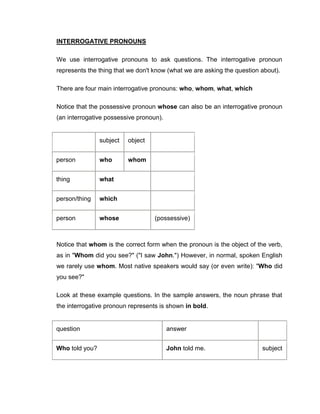Learn interrogative pronouns
•Télécharger en tant que DOCX, PDF•
2 j'aime•1,508 vues
Signaler
Partager
Signaler
Partager

Contenu connexe
Tendances (20)
Sentence Types: Declarative, Interrogative, Imperative and Exclamatory 

Sentence Types: Declarative, Interrogative, Imperative and Exclamatory
En vedette
En vedette (20)
Similaire à Learn interrogative pronouns
Similaire à Learn interrogative pronouns (20)
Classes and morphological categories of pronouns in the Old English

Classes and morphological categories of pronouns in the Old English
Luis Maldonado Universidad Central del Ecuador(Pronouns)

Luis Maldonado Universidad Central del Ecuador(Pronouns)
LLPSI Cap. 3, De Pronominibus Interrogativis Relativisque

LLPSI Cap. 3, De Pronominibus Interrogativis Relativisque
A comprehensive English grammar guide for EFL/ESL teachers

A comprehensive English grammar guide for EFL/ESL teachers
Plus de eIzAmQaRqUn90
Plus de eIzAmQaRqUn90 (20)
Learn interrogative pronouns
- 1. INTERROGATIVE PRONOUNS<br />We use interrogative pronouns to ask questions. The interrogative pronoun represents the thing that we don't know (what we are asking the question about). <br />There are four main interrogative pronouns: who, whom, what, which <br />Notice that the possessive pronoun whose can also be an interrogative pronoun (an interrogative possessive pronoun).<br /> subjectobject personwhowhom thingwhat person/thingwhich personwhose(possessive)<br /> <br />Notice that whom is the correct form when the pronoun is the object of the verb, as in quot; Whom did you see?quot; (quot; I saw John.quot; ) However, in normal, spoken English we rarely use whom. Most native speakers would say (or even write): quot; Who did you see?quot; <br />Look at these example questions. In the sample answers, the noun phrase that the interrogative pronoun represents is shown in bold. <br />questionanswer Who told you? John told me. subjectWhom did you tell? I told Mary. objectWhat's happened? An accident's happened. subjectWhat do you want? I want coffee. objectWhich came first? The Porsche 911 came first. subjectWhich will the doctor see first? The doctor will see the patient in blue first. objectThere's one car missing. Whose hasn't arrived? John's (car) hasn't arrived. subjectWe've found everyone's keys. Whose did you find? I found John's (keys). object<br />Note that we sometimes use the suffix quot; -everquot; to make compounds from some of these pronouns (mainly whoever, whatever, whichever). When we add quot; -everquot; , we use it for emphasis, often to show confusion or surprise. Look at these examples: <br />Whoever would want to do such a nasty thing? <br />Whatever did he say to make her cry like that? <br />They're all fantastic! Whichever will you choose? <br />
